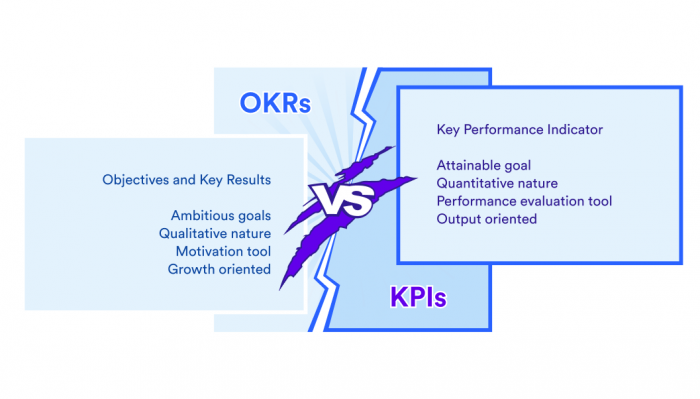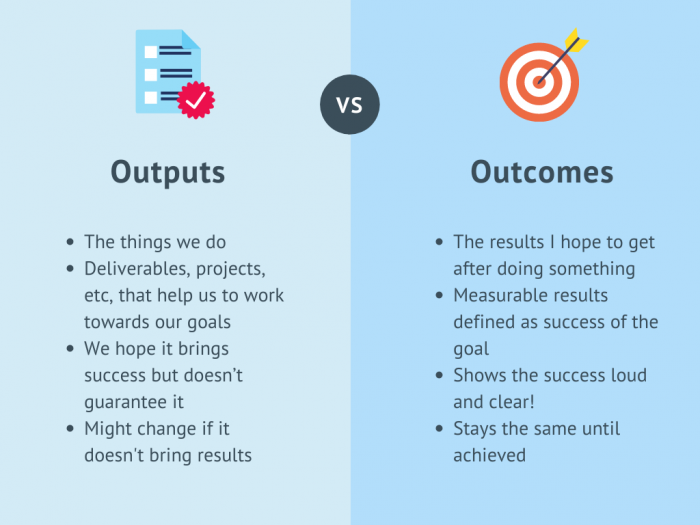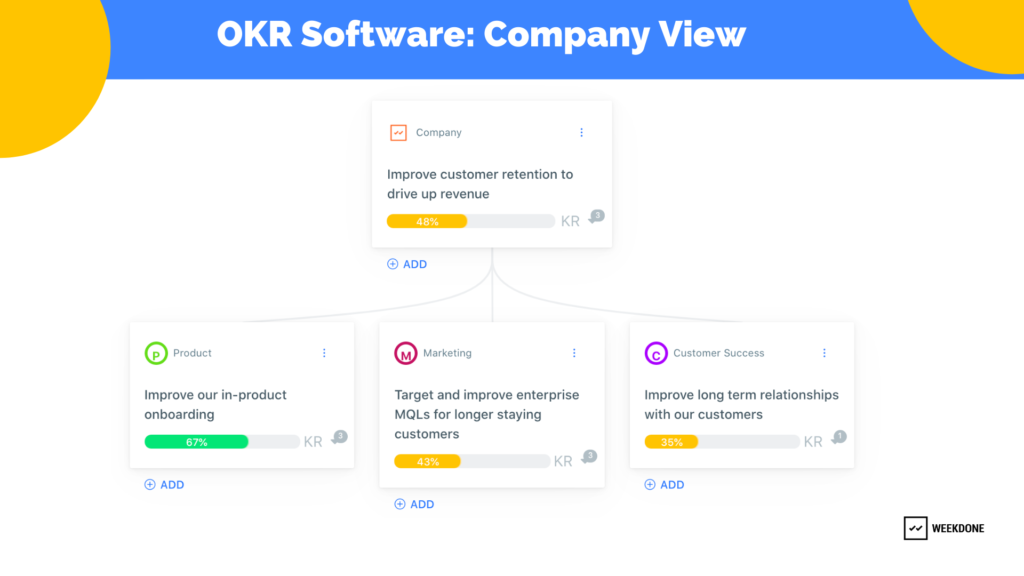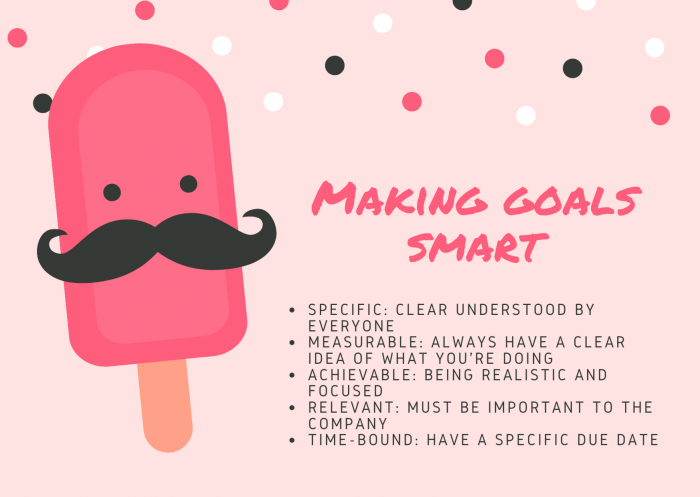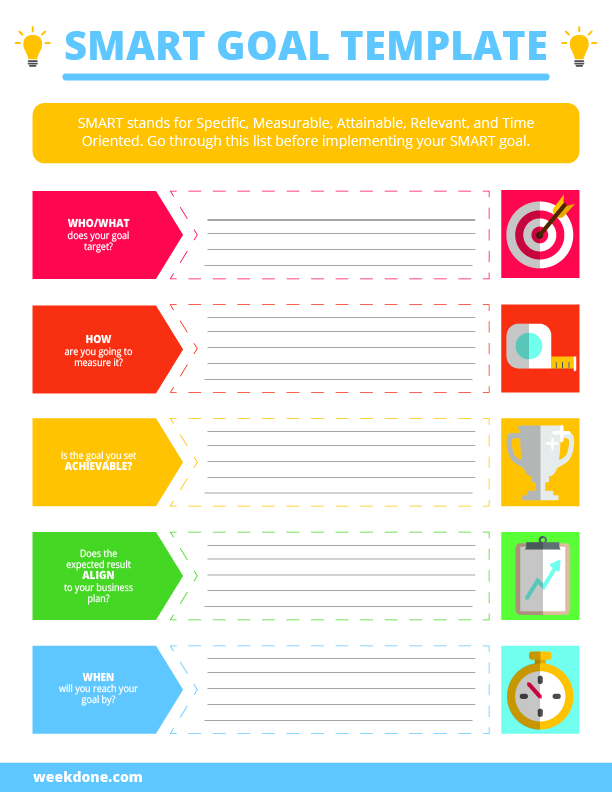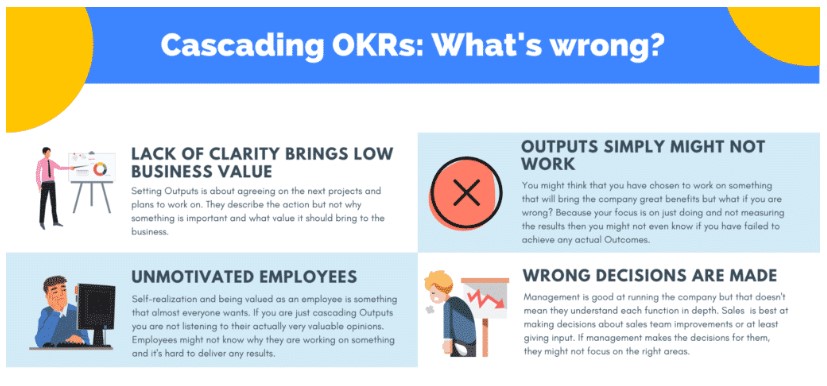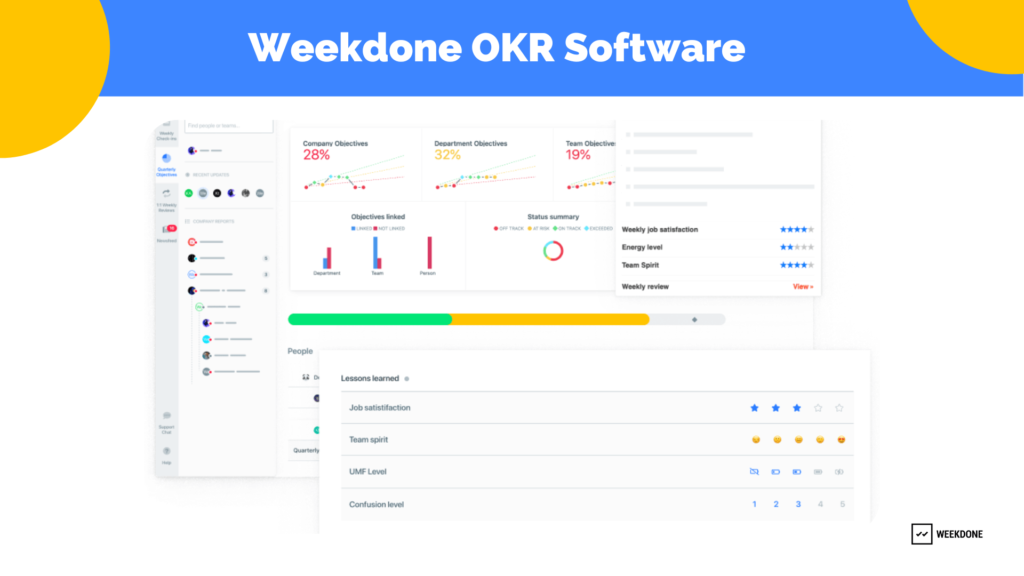Approximately 33% of small businesses do not succeed in the first two years. There are many reasons why businesses fail – from lack of target market understanding, and improper financial planning, to lack of agility. For small businesses at any stage, one of the key success factors is planning and setting business and employee performance goals.
A good place to start is to create goals that are specific, realistic, and ambitious. Developing good company goals for employees can align team members with a shared company vision.
While the process of goal-setting can be challenging, discussing employee goal ideas, and communicating precise objectives can improve employee motivation and productivity.
Find out about the different approaches to creating, measuring, and tracking performance goals and discover some of the top employee performance goals and objectives examples.
Why Employee Goals Matter: Effects To Job Satisfaction
Employees need purpose to feel satisfied with their job. They need to feel emotionally connected to the work they do and know they make a difference. Setting employee goals will increase job satisfaction through measurability and transparency to larger company direction.
Different types of employee goals affect job satisfaction and employee performance differently. Self management goals promote independency and critical thinking skills through added responsibility and encourage employees to focus more on self management.
Team goals limit independency while still preserving the existence of purpose in the work they do. Management goals allow tracking progress with more consistency thus developing a better sense of individual employee performance.
Think about it. Well-crafted professional development goals can be designed to challenge individuals, encouraging skill development and continuous learning. Achieving goals often involves acquiring new knowledge and skills, which benefits both the team members and the organization.
As I mentioned, employees need satisfaction. When employees feel that their efforts are recognized and contribute to the success of the organization, satisfaction tends to increase. Satisfied employees are more likely to stay with the company, reducing turnover and associated costs.
Setting Employee Goals: Where to Start?
If you are wondering where to begin when setting employee performance goals, it is important to first understand the different approaches and measurable goals you can use.
Consider using these different measurable values that demonstrate how effectively you are achieving your key business objectives:
All these measurable goals and approaches serve different purposes.
Using KPIs to set business goals for employees
If you want to track the overall business performance and understand how you progress towards your business goals, choose KPIs.
KPIs provide information about whether you are achieving your targets. They can be set to measure performance on the company, department, team, and individual levels as well.
KPIs are usually achieved with business-as-usual activities and can be used to measure the completion of daily tasks. In other words, it indicates whether people are keeping up with their regular tasks and completing them on time. Analyzing your performance against KPI targets allows you to understand how to keep your business going.
Simply put, to have a well-functioning company you need KPIs to keep an eye on its performance.
Remember, KPIs are different from OKRs. KPIs are typically set by management teams and measure overall performance whereas OKRs are team-specific goals created in collaboration with all team members.
Using MBO for goal setting
If setting performance targets is easier when you define top company goals first and then determine employees’ objectives based on that, consider using MBO for goal setting.
MBO helps all employees see their accomplishments in connection to the company goals as they execute their tasks. This goal-setting approach promotes alignment between activity and outcome, which significantly increases productivity.
Typically, the top management team needs to set company objectives and then communicate them to employees. Managers must monitor, evaluate, and reward employees as and when they achieve their performance goals.
The MBO approach works best when the top management prefers to closely set, track, and manage employee performance goals.
Using OKRs for setting employee goals
The OKR goal-setting framework goes beyond managing and tracking every task. By setting OKRs you can identify areas of improvement for the quarter and brainstorm ideas to find new ways to achieve better results.
Goals expressed as OKRs should be ambitious – which means exploring opportunities and finding new ways to do things differently. To get better business results you need to change what you do and how you do it.
The OKR approach is not about linking employee performance with tasks completed. It is about promoting innovative thinking and urging employees to strive for excellence without the fear of not meeting their performance goals. Setting OKRs lets you focus on the outcomes (expected measurable results) instead of only the output (completed tasks).
OKR is a forward-looking goal-setting method that fuels teamwork and accountability. If you want to achieve greater collaboration and have your teams truly invested in their work, you should never make the mistake of using OKRs for employee performance management.
Best Practices to Set Effective Employee Goals
Act now, set employee performance goals today
Goal setting can be a challenging process. It urges you and your team to think innovatively and step out of your comfort zone. The sooner the performance goals are set, the clearer it becomes for every team member to understand the direction they need to work towards. Gaining a clear vision through goal setting can significantly motivate and improve productivity.
Stay committed, record goals
Goals when not documented typically have lower commitment levels. Creating performance goals mentally can be vague and uncertain, therefore, you need to help employees write down and set their goals. Check out these tips and tricks for writing good objectives and key results. Recording goals in a OKR software is one of the ways to provide clarity to the whole team about the expectations and aspirations.
Stay on the same page, make goals public
Recording goals is not enough. Employee goals need to be shared with everyone so that the whole team can plan accordingly, together. Our OKR software has special features such as Weekly Check-ins, visual dashboards for reporting, and integrations with existing workplace tools, that help your team to collaborate, set, and communicate goals.
Make it specific, create SMART goals
Setting specific, challenging, and obtainable goals is a great way to build high-performing teams. The SMART goals framework is an important guide in the goal-setting process. Some of the best employee performance goals are those that help you and your team focus on achievable goals and help you assess and reevaluate those goals to achieve optimal results.
If you want to refine and revise your objectives and key results to create SMART goals, use this editable and printable worksheet.
Stop cascading, align employee goals with team and organization goals
It is easier to achieve success when different level objectives are aligned. Spend enough time communicating the company’s mission, vision, and goals to everyone. Make sure people understand how they contribute to the company’s success.
Strategic goal alignment is an important step in improving teamwork in the workplace and can make it easier to align individual, team, and company objectives.
Set stretch goals, let employees step out of their comfort zone
Having specific yet difficult goals lead to higher performance. Setting challenging yet attainable goals separates average employees from outstanding ones. Stretch goals urge employees to go beyond their limits – it fosters innovative thinking and creative problem-solving.
8 Examples of Employee Goals and Objectives
These employee goals examples within the OKR framework can give you a better understanding of why an Objective that is supported by Key Results is the best method to set and track performance goals.
OKR Example for Marketing
Objective: Improve community management to encourage positive word-of-mouth
Key Results:
KR1: Increase the referrals from clients from 5% to 15%
KR2: Increase the newsletter contact base from 1000 to 4000 readers
KR3: Increase the number of registrations from the testimonials page from 100 to 200
OKR Example for Sales
Objective: Grow the number of enterprise client accounts through increasing transaction value & retention
Key Results:
KR1: Increase closes with the mid-tier package from 50% to 80%
KR2: Increase the enterprise deal size from $300 to $400 with upsells
KR3: Reduce churn rate from 10% to 5% for the last 90 days
OKR Example for Product
Objective: Increase the delivery speed of launching new features
Key Results:
KR1: Increase the sprint team velocity from 20 to 30 points
KR2: Reduce the number of bugs per feature from 10 to 5
KR3: Reduce average lead time from product feature definition to delivery from 6 to 4 weeks
OKR Example for HR
Objective: Develop a sustainable candidate lead strategy
Key Results:
KR1: Partner with recruitment agencies to interview 60 candidates
KR2: Write 5 articles promoting us as a place to work read by 1500 unique visitors
KR3: Increase the job web page visits from 600 to 900
OKR Example for Software Development
Objective: Improve cloud security to be more trusted by our customers
Key Results:
KR1: Reduce security incidents per month from 2 to 0
KR2: Assign certain access control to each of 4 user types
KR3: Increase vulnerability scans from 3 to 6
OKR Example for Design
Objective: Promote the new brand image through design deliverables to improve brand awareness and recall
Key Results:
KR1: Design new graphs/templates for at least 50% of top-performing posts
KR2: Increase the downloads of the templates and infographics from the average of 200 to 800 a month
KR3: Create designs to promote 10 top-performing assets on social media to improve engagement by 40%
OKR Example for Finance
Objective: Improve the warehouse inventory record-keeping to save time during mandatory inventory checks
Key Results:
KR1: Reduce the time needed to complete inventory checks from 16h to 4h on average
KR2: Automate 3 critical processes to avoid human errors
KR3: Reduce the % of discrepancies between bookkeeping data and facts from 6% to 3%
OKR Example for Customer Success
Objective: Streamline the feedback process to improve customer satisfaction
Key Results:
KR1: Decrease the number of complaints and negative feedback per quarter from 15 to 5
KR2: Increase positive feedback items and praise from 5 to 15 per quarter
KR3: Increase end-user satisfaction rating from 4.0 to 4.5
Level-Up Your Goal-Setting Process
Setting proper employee goals is an important step toward realizing your company’s vision.
Set goals and categorize them into daily, weekly, and monthly tasks to focus your plans on what is important. Teams that have clarity about priority tasks and end goals are known to deliver better results.
In Weekdone we have integrated the Objectives and Key Results methodology with weekly reports. This way, a manager gets a clear overview of how each team member is working towards their goals regularly. You can get quick feedback from employees on their progress and guide everyone to stay aligned.
Using an OKR software can help you level up your goal-setting process. Find out how you can help your employees create goals successfully with a free trial.


